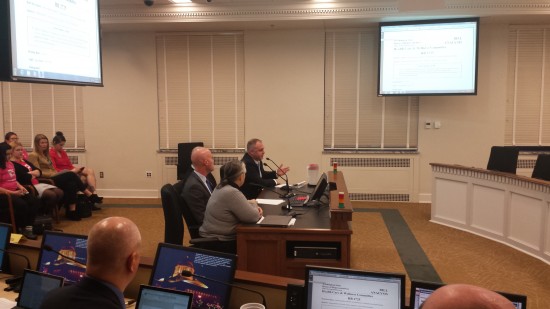Published by the Washington State House Democrats on February 2, 2016
Bill aims to save lives of diabetics and other patients
Brian Chase of Longview had a simple message to lawmakers: going without his insulin could kill him.Chase made the trip to the state capitol on Tuesday, Jan. 26 to speak in favor of House Bill 2727 introduced by me. The legislation was heard in the House Healthcare and Wellness Committee.
This is about helping hundreds of thousands of citizens dependent on life sustaining medications like Brian from Longview and across the state. A simple change to our state laws could save lives. There is no reason why a single person in Washington should fall into a diabetic coma, or lose their life, because numbers on a piece of paper are a day too late.
The legislation would allow pharmacists to dispense a 30-day supply of medicine to patients with expired prescriptions under specific, life-saving circumstances.
Under current state law, patients with expired prescriptions can only get a three day refill. Unfortunately three days just isn’t long enough for most working folks to schedule and see their Doctor in person for a routine medicines that diabetics take.
Waiting for an additional doctor appointment to fill a prescription can be dangerous or deadly, especially in small towns and rural areas where there’s a doctor shortage and appointments are hard to get.
The proposal allows pharmacists to dispense to patients if: the patient has attempted to contact the prescribing practitioner without success, the patient has been on a constant drug therapy and the drug is not a controlled substance. Also, a pharmacist can only dispense to the same patient once within 12 months.
If you or someone you know relies on medication like insulin to stay healthy and alive, I’d be interested in hearing your story. Please get in touch with my office and I’ll share your experiences with other lawmakers as we consider this reform and other ways to make our health care system more affordable and effective for everybody, rich or poor.
CLT means jobs that stick around
There’s an exciting new way to use wood instead of cement in construction. Cross-laminated timber (CLT) isn’t plywood. It’s layers of big, strong pieces of lumber, like 2 x 8’s, glued together with other layers stacked in alternating directions.
It’s lighter than cement, easier to handle and strong. For our state, it also means jobs, because CLT can use small trees, making thinning jobs profitable while reducing the danger of wildfires.
Getting this started here would mean jobs for loggers and for skilled workers to craft this new way of using our forests. In the House, we’re working on ideas and legislation to jump-start this new technology in Washington, so our workers get those jobs. But we have to work fast before other states beat us to the market.
House Bill 2857 sponsored by my colleague, Rep. Brian Blake, would help jump-start this new industry with tax incentives. We’re working with community partners—loggers, mills, and local officials—on items in our state’s construction budget and other reforms to help make Washington a national leader on this new technology.
If we win the race to get this started in America, we could export our products and expertise to other states. That’s why we say CLT means jobs that stick around.
Education
Last week was a big week for education in Washington state. Your House of Representatives voted to achieve excellence in our schools and give our 1 million kids in public schools greater opportunities to learn. Among the bills we approved:
Local Levies – I voted in support of HB 2366 – the bipartisan plan for a solution to the problem of reliance on local levies to pay teachers. That’s the final goal we must reach in to keep our promise of fully funding education.
Teacher Shortage – Washington state has a teacher shortage crisis. It’s not a problem. It’s not a dilemma. It’s a crisis. I voted for a bipartisan bill to help get more qualified substitute teachers into our classrooms.
High Stakes Testing – I voted for a bipartisan bill to fix the state’s broken student assessment system. Students should be spending more time in the classroom learning and less time taking tests.
Disaster recovery – This is a great bipartisan bill that will help communities develop a plan to continue delivering educational services to students after a natural disaster.
Family Engagement Coordinators – This legislation increases family involvement in their kids’ education.
What Lies Ahead?
These votes are steps in the right direction toward reaching our goals and ensuring our education system is fully funded.
I was proud to take these votes today. Sadly, the fate of these bills is unknown in the Republican-controlled Senate.
